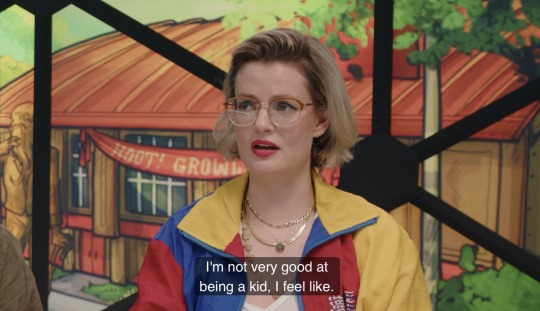Text



hey siobhan? what if i cried?? right in front of you???
#sob worthy moment#if i had a nickel everytime a pc conversation with sandra lynn resulted in my tears id have two nickels#dimension 20#fhjy
2K notes
·
View notes
Text
Riz has spent this whole season, struggling so much and trying so hard to squeeze blood from a stone, to be in a dozen places at once, to stay afloat, to secure his future, to save the world (again), barely having time to spend with his mom and literally having to be in hell so he can have a few blessed minutes to chat with his murdered father about work (which yes, is an act of love when a Gukgak is doing it but God, he's so tired).
And Kipperlilly is watching this kid, who is taking stress tokens for his friends even though he's at capacity himself, whose blood is more coffee than anything else at this point because you can't solve problems when you're asleep, who signed up for an exam with a 100% mortality rate for lack of other viable options, and saying to herself, "You lucky bastard. It's not fair."
1K notes
·
View notes
Text
biological differences between men and women are inherently neutral. they do not indicate male superiority over female people. to suggest so is inherently sexist. to complain when female sports cater to female anatomy - such as the smaller balls in the wnba because women tend to have smaller hands - is what sexists do. they want women to be forced to prove ourselves according to standards designed for men because they want to see us fail. it is sexist to argue that women who wish to compete on their own terms are pronouncing themselves as inferior. nobody said that but you. because you’re a sexist that hates women
4K notes
·
View notes
Text
353 notes
·
View notes
Text
if i could remove the shame and guilt girls feel from same sex attraction and give it to porn addicted straight boys, i would. how can they feel nothing for the way they dehumanize us while sapphics apologize just for existing?
737 notes
·
View notes
Text
what's that one thing where they asked how ripely from alien was so realistic and believable as a female character in scifi for once and they were like "well we just took the dude from the original script and made him a girl and changed nothing else. it works bc men and women are the same?" and people were like "woah no way" and then didn't learn anything from that for 20 years
77K notes
·
View notes
Text
every time I see a post about taylor lyrics I can't help think that she's being funny on purpose but ppl don't think women can't be funny. like tortured poets department is a funny name like that could be a douglas adams bit and ppl keep taking these "cringe" lyrics out of context and saying how dumb she is to think she's a tortured poet. I don't think she thinks that I think maybe she is funny on purpose...
556 notes
·
View notes
Text



every time I click on a post to see something outrageous a "radical feminist" did/said it's about a conservative dude for some reason
1K notes
·
View notes
Text
life actually gets better when you leave the house consistently btw like im serious
234K notes
·
View notes
Text

TRAs making up insane strawmen terf arguments because they don't actually know what we believe: exhibit A
What we actually believe:

#the irony that the meme is actually gender ideology#making more boxes just supports the idea of boxes#thinking outside of boxes and recognizing biological reality is actually revolutionary#radical feminism#gc#gender critical
1K notes
·
View notes
Text
““The girls are unable to say anything because they are always being policed. You can’t ask questions, you won’t get the evidence on a silver platter. But when you are going around, you hear things and see things,” Singh explains, sitting in a nondescript office, piles of cardboard files all over the floor, documenting the thousands of girls they have rescued over the years, approximately 4,000 at last count.
“Most of the time the girls are locked up and they are only allowed out when a customer comes in. To ensure they are not interacting with the customers, the brothel keepers are always banging on the door and take away the mobiles of the customers.”
As a result of an 11-month long operation, conducted before the pandemic, Guria India were able to rescue 136 underage victims of traffickers, resulting in 61 brothels being shut down.”
In the narrow alleyways of Meerganj, the notorious red light district in the city of Allahbad, a man dressed in a brown kurta with a rucksack walks past the dilapidated brothels shouting ‘lipsticks for sale, good prices.’
He barely warrants a glance, one of dozens of street sellers who stroll down the alley daily, hawking their wares, a common sight in the hustle and bustle of cities in India.
Word has got around that he’s selling good quality products like Max Factor and other brands the brothel girls recognise from billboards featuring their favourite Bollywood actresses. He’s cheaper than the other sellers and lets them pay in instalments.
A group of young girls flock to him, picking up bright lipsticks and face powders, to make them look older than they are, or perhaps not, depending on the client’s preferences.
But this is no ordinary seller. He is from Guria India, an organisation which rescues and rehabilitates women and underage girls trapped in the sex trade.
He has been working undercover, disguised as a cosmetics seller, gathering evidence of victims of traffickers who have been forced into sex work, many of whom are underage and often thousands of miles away from home.
“You are working on a razor’s edge. There are no second chances. One wrong move and you could be killed. It’s not like a movie where you get a retake,” says Ajeet Singh, Director of Guria India.
The nature of trafficking is changing and so activists are having to find new and innovative means to take them on.
Singh said he came up with the idea of posing as a make-up seller after he found that the brothel owners were always one step ahead of him.
“It was always very difficult to rescue the girls because someone would leak the information and the brothel keepers would move the girls. The girls were not a priority for the system, so the police were not helpful. We had to be proactive in getting the evidence.”
Using rudimentary equipment he bought from Delhi, including spy cams concealed in a pen and button, he began scouring the streets of the red light district for almost a year.
“Make-up is something very enticing for girls. If you go to India, you’ll see street sellers in every city so I knew I would blend in,” he said.
“The girls are unable to say anything because they are always being policed. You can’t ask questions, you won’t get the evidence on a silver platter. But when you are going around, you hear things and see things,” Singh explains, sitting in a nondescript office, piles of cardboard files all over the floor, documenting the thousands of girls they have rescued over the years, approximately 4,000 at last count.
“Most of the time the girls are locked up and they are only allowed out when a customer comes in. To ensure they are not interacting with the customers, the brothel keepers are always banging on the door and take away the mobiles of the customers.”
As a result of an 11-month long operation, conducted before the pandemic, Guria India were able to rescue 136 underage victims of traffickers, resulting in 61 brothels being shut down.
Social media ‘weapon of choice’ for traffickers
The sting, which was signed off by local people, used undercover filming to collect evidence against offenders. When enough had been gathered, ten members of the Guria India team joined police as they carried out dawn raids, using iron cutters to access properties where the victims were being held.
There are an estimated 1.2 million children under 18 working in brothels in India, many of whom have been victims of sex traffickers. Approximately 75 per cent of the cases Guria India dealt with involved under age victims ranging from just six months to 17.
The majority of these trafficked children are from lower castes and more than half of them are from families living below the poverty line.
While many of the girls sold to brothels are trafficked by relatives or family friends, in recent years, social media, with its low-risk and high rewards, has become the weapon of choice of traffickers, luring victims in with lucrative job offers or promises of marriage.
“The internet and exploitative romantic relationships are key factors for trafficking in recent times,” said children’s rights activist Bharti Ali.
“Often, the police don’t start their search in cases of adolescent girls immediately as they believe it to be a case of elopement. Many cases end up in girls being sold further by the boy/person they trusted or who promised them false marriage.
“When girls go missing, parents often try to search within their own community, her friends and relatives. This is when they lose critical time. When they suspect that she may have eloped, they may tend to not report at all to protect family honour … The girls too are unable to report as the traffickers keep a close watch on them.”
For victims of traffickers, their introduction into the world of prostitution is a brutal and violent one, in which they face beatings, gang rape and starvation. Some victims also reported having chilli powder placed on their genitalia and being subjected to electric shocks.
Among the girls they have rescued is Sarita, who was just 12-years-old when she was sold to a sex trafficker by her older brother and was transported 700 km away to work in a brothel.
“My mum was working in Mumbai and I lived with my sister. My brother was a drug addict. He told me he was taking me to see my mum but instead he sold me to a trafficker. I was locked in a room and beaten and raped by several men. I managed to find a phone and called my mum,” she said.
Sarita’s mother, along with the police and Guria India activists, were able to rescue her and relocate the family. However, the majority of victims are not so lucky. India remains a socially conservative society and victims of trafficking will often be ostracised by their families and community.
Rescuing victims of trafficking is only half the battle, while keeping them out of the hands of traffickers presents another challenge.
Rehabilitating victims back into a society which was already hostile to them in the first place is difficult and often the girls will end up falling back into the hands of traffickers.
In one case, 57 girls who were rescued by Guria were sent to a shelter home in Agra for rehabilitation, but were re-trafficked by the superintendent of the centre. Just this week, the superintendent was acquitted by the Supreme Court and Guria India is currently fighting the decision.
Despite the setbacks, Singh remains hopeful. “Although I don’t think we can eradicate child prostitution in my lifetime, I’m hopeful we can set the foundations to make the change,” he said.
And sometimes all it takes is a rucksack and a Max Factor lipstick.
338 notes
·
View notes
Text
The Troubling Trend in Teenage Sex
Peggy Orenstein out here doing God's work
NY Times 4/12/24

By Peggy Orenstein
Ms. Orenstein is the author of “Boys & Sex: Young Men on Hookups, Love, Porn, Consent and Navigating the New Masculinity” and “Girls & Sex: Navigating the Complicated New Landscape.”
Debby Herbenick is one of the foremost researchers on American sexual behavior. The director of the Center for Sexual Health Promotion at Indiana University and the author of the pointedly titled book “Yes, Your Kid,” she usually shares her data, no matter how explicit, without judgment. So I was surprised by how concerned she seemed when we checked in on Zoom recently: “I haven’t often felt so strongly about getting research out there,” she told me. “But this is lifesaving.”
For the past four years, Dr. Herbenick has been tracking the rapid rise of “rough sex” among college students, particularly sexual strangulation, or what is colloquially referred to as choking. Nearly two-thirds of women in her most recent campus-representative survey of 5,000 students at an anonymized “major Midwestern university” said a partner had choked them during sex (one-third in their most recent encounter). The rate of those women who said they were between the ages 12 and 17 the first time that happened had shot up to 40 percent from one in four.
As someone who’s been writing for well over a decade about young people’s attitudes and early experience with sex in all its forms, I’d also begun clocking this phenomenon. I was initially startled in early 2020 when, during a post-talk Q. and A. at an independent high school, a 16-year-old girl asked, “How come boys all want to choke you?” In a different class, a 15-year-old boy wanted to know, “Why do girls all want to be choked?” They do? Not long after, a college sophomore (and longtime interview subject) contacted me after her roommate came home in tears because a hookup partner, without warning, had put both hands on her throat and squeezed.
I started to ask more, and the stories piled up. Another sophomore confided that she enjoyed being choked by her boyfriend, though it was important for a partner to be “properly educated” — pressing on the sides of the neck, for example, rather than the trachea. (Note: There is no safe way to strangle someone.) A male freshman said “girls expected” to be choked and, even though he didn’t want to do it, refusing would make him seem like a “simp.” And a senior in high school was angry that her friends called her “vanilla” when she complained that her boyfriend had choked her.
Sexual strangulation, nearly always of women in heterosexual pornography, has long been a staple on free sites, those default sources of sex ed for teens. As with anything else, repeat exposure can render the once appalling appealing. It’s not uncommon for behaviors to be normalized in porn, move within a few years to mainstream media, then, in what may become a feedback loop, be adopted in the bedroom or the dorm room.
Choking, Dr. Herbenick said, seems to have made that first leap in a 2008 episode of Showtime’s “Californication,” where it was still depicted as outré, then accelerated after the success of “Fifty Shades of Grey.” By 2019, when a high school girl was choked in the pilot of HBO’s “Euphoria,” it was standard fare. A young woman was choked in the opener of “The Idol” (again on HBO and also, like “Euphoria,” created by Sam Levinson; what’s with him?). Ali Wong plays the proclivity for laughs in a Netflix special, and it’s a punchline in Tina Fey’s new “Mean Girls.” The chorus of Jack Harlow’s “Lovin On Me,” which topped Billboard’s Hot 100 chart for six nonconsecutive weeks this winter and has been viewed over 99 million times on YouTube, starts with, “I’m vanilla, baby, I’ll choke you, but I ain’t no killer, baby.” How-to articles abound on the internet, and social media algorithms feed young people (but typically not their unsuspecting parents) hundreds of #chokemedaddy memes along with memes that mock — even celebrate — the potential for hurting or killing female partners.
I’m not here to kink-shame (or anything-shame). And, anyway, many experienced BDSM practitioners discourage choking, believing it to be too dangerous. There are still relatively few studies on the subject, and most have been done by Dr. Herbenick and her colleagues. Reports among adolescents are now trickling out from the United Kingdom, Australia, Iceland, New Zealand and Italy.
Sign up for the Opinion Today newsletter Get expert analysis of the news and a guide to the big ideas shaping the world every weekday morning.
Twenty years ago, sexual asphyxiation appears to have been unusual among any demographic, let alone young people who were new to sex and iffy at communication. That’s changed radically in a short time, with health consequences that parents, educators, medical professionals, sexual consent advocates and teens themselves urgently need to understand.
Sexual trends can spread quickly on campus and, to an extent, in every direction. But, at least among straight kids, I’ve sometimes noticed a pattern: Those that involve basic physical gratification — like receiving oral sex in hookups — tend to favor men. Those that might entail pain or submission, like choking, are generally more for women.
So, while undergrads of all genders and sexualities in Dr. Herbenick’s surveys report both choking and being choked, straight and bisexual young women are far more likely to have been the subjects of the behavior; the gap widens with greater occurrences. (In a separate study, Dr. Herbenick and her colleagues found the behavior repeated across the United States, particularly for adults under 40, and not just among college students.) Alcohol may well be involved, and while the act is often engaged in with a steady partner, a quarter of young women said partners they’d had sex with on the day they’d met also choked them.
Either way, most say that their partners never or only sometimes asked before grabbing their necks. For many, there had been moments when they couldn’t breathe or speak, compromising the ability to withdraw consent, if they’d given it. No wonder that, in a separate study by Dr. Herbenick, choking was among the most frequently listed sex acts young women said had scared them, reporting that it sometimes made them worry whether they’d survive.
Among girls and women I’ve spoken with, many did not want or like to be sexually strangled, though in an otherwise desired encounter they didn’t name it as assault. Still, a sizable number were enthusiastic; they requested it. It is exciting to feel so vulnerable, a college junior explained. The power dynamic turns her on; oxygen deprivation to the brain can trigger euphoria.
That same young woman, incidentally, had never climaxed with a partner: While the prevalence of choking has skyrocketed, rates of orgasm among young women have not increased, nor has the “orgasm gap” disappeared among heterosexual couples. “It indicates they’re not doing other things to enhance female arousal or pleasure,” Dr. Herbenick said.
When, for instance, she asked one male student who said he choked his partner whether he’d ever tried using a vibrator instead, he recoiled. “Why would I do that?” he asked.
Perhaps, she responded, because it would be more likely to produce orgasm without risking, you know, death.
In my interviews, college students have seen male orgasm as a given; women’s is nice if it happens, but certainly not expected or necessarily prioritized (by either partner). It makes sense, then, that fulfillment would be less the motivator for choking than appearing adventurous or kinky. Such performances don’t always feel good.
“Personally, my hypothesis is that this is one of the reasons young people are delaying or having less sex,” Dr. Herbenick said. “Because it’s uncomfortable and weird and scary. At times some of them literally think someone is assaulting them but they don’t know. Those are the only sexual experiences for some people. And it’s not just once they’ve gotten naked. They’ll say things like, ‘I’ve only tried to make out with someone once because he started choking and hitting me.’”
Keisuke Kawata, a neuroscientist at Indiana University’s School of Public Health, was one of the first researchers to sound the alarm on how the cumulative, seemingly inconsequential, sub-concussive hits football players sustain (as opposed to the occasional hard blow) were key to triggering C.T.E., the degenerative brain disease. He’s a good judge of serious threats to the brain. In response to Dr. Herbenick’s work, he’s turning his attention to sexual strangulation. “I see a similarity” to C.T.E., he told me, “though the mechanism of injury is very different.” In this case, it is oxygen-blocking pressure to the throat, frequently in light, repeated bursts of a few seconds each.
Strangulation — sexual or otherwise — often leaves few visible marks and can be easily overlooked as a cause of death. Those whose experiences are nonlethal rarely seek medical attention, because any injuries seem minor: Young women Dr. Herbenick studied mostly reported lightheadedness, headaches, neck pain, temporary loss of coordination and ear ringing. The symptoms resolve, and all seems well. But, as with those N.F.L. players, the true effects are silent, potentially not showing up for days, weeks, even years.
According to the American Academy of Neurology, restricting blood flow to the brain, even briefly, can cause permanent injury, including stroke and cognitive impairment. In M.R.I.s conducted by Dr. Kawata and his colleagues (including Dr. Herbenick, who is a co-author of his papers on strangulation), undergraduate women who have been repeatedly choked show a reduction in cortical folding in the brain compared with a never-choked control group. They also showed widespread cortical thickening, an inflammation response that is associated with elevated risk of later-onset mental illness. In completing simple memory tasks, their brains had to work far harder than the control group, recruiting from more regions to achieve the same level of accuracy.
The hemispheres in the choked group’s brains, too, were badly skewed, with the right side hyperactive and the left underperforming. A similar imbalance is associated with mood disorders — and indeed in Dr. Herbenick’s surveys girls and women who had been choked were more likely than others (or choked men) to have experienced overwhelming anxiety, as well as sadness and loneliness, with the effect more pronounced as the incidence rose: Women who had experienced more than five instances of choking were two and a half times as likely as those who had never been choked to say they had been so depressed within the previous 30 days they couldn’t function. Whether girls and women with mental health challenges are more likely to seek out (or be subjected to) choking, choking causes mood disorders, or some combination of the two is still unclear. But hypoxia, or oxygen deprivation — judging by what research has shown about other types of traumatic brain injury — could be a contributing factor. Given the soaring rates of depression and anxiety among young women, that warrants concern.
Now consider that every year Dr. Herbenick has done her survey, the number of females reporting extreme effects from strangulation (neck swelling, loss of consciousness, losing control of urinary function) has crept up. Among those who’ve been choked, the rate of becoming what students call “cloudy” — close to passing out, but not crossing the line — is now one in five, a huge proportion. All of this indicates partners are pressing on necks longer and harder.
The physical, cognitive and psychological impacts of sexual choking are disturbing. So is the idea that at a time when women’s social, economic, educational and political power are in ascent (even if some of those rights may be in jeopardy), when #MeToo has made progress against harassment and assault, there has been the popularization of a sex act that can damage our brains, impair intellectual functioning, undermine mental health, even kill us. Nonfatal strangulation, one of the most significant indicators that a man will murder his female partner (strangulation is also one of the most common methods used for doing so), has somehow been eroticized and made consensual, at least consensual enough. Yet, the outcomes are largely the same: Women’s brains and bodies don’t distinguish whether they are being harmed out of hate or out of love.
By now I’m guessing that parents are curled under their chairs in a fetal position. Or perhaps thinking, “No, not my kid!” (see: title of Dr. Herbenick’s book above, which, by the way, contains an entire chapter on how to talk to your teen about “rough sex”).
I get it. It’s scary stuff. Dr. Herbenick is worried; I am, too. And we are hardly some anti-sex, wait-till-marriage crusaders. But I don’t think our only option is to wring our hands over what young people are doing.
Parents should take a beat and consider how they might give their children relevant information in a way that they can hear it. Maybe reiterate that they want them to have a pleasurable sex life — you have already said that, right? — and also want them to be safe. Tell them that misinformation about certain practices, including choking, is rampant, that in reality it has grave health consequences. Plus, whether or not a partner initially requested it, if things go wrong, you’re generally criminally on the hook.
Dr. Herbenick suggests reminding them that there are other, lower-risk ways to be exploratory or adventurous if that is what they are after, but it would be wisest to delay any “rough sex” until they are older and more skilled at communicating. She offers language when negotiating with a new partner, such as, “By the way, I’m not comfortable with” — choking, or other escalating behaviors such as name-calling, spitting and genital slapping — “so please don’t do it/don’t ask me to do it to you.” They could also add what they are into and want to do together.
I’d like to point high school health teachers to evidence-based porn literacy curricula, but I realize that incorporating such lessons into their classrooms could cost them their jobs. Shafia Zaloom, a lecturer at the Harvard Graduate School of Education, recommends, if that’s the case, grounding discussions in mainstream and social media. There are plenty of opportunities. “You can use it to deconstruct gender norms, power dynamics in relationships, ‘performative’ trends that don’t represent most people’s healthy behaviors,” she said, “especially depictions of people putting pressure on someone’s neck or chest.”
I also know that pediatricians, like other adults, struggle when talking to adolescents about sex (the typical conversation, if it happens, lasts 40 seconds). Then again, they already caution younger children to use a helmet when they ride a bike (because heads and necks are delicate!); they can mention that teens might hear about things people do in sexual situations, including choking, then explain the impact on brain health and why such behavior is best avoided. They should emphasize that if, for any reason — a fall, a sports mishap or anything else — a young person develops symptoms of head trauma, they should come in immediately, no judgment, for help in healing.
The role and responsibility of the entertainment industry is a tangled knot: Media reflects behavior but also drives it, either expanding possibilities or increasing risks. There is precedent for accountability. The European Union now requires age verification on the world’s largest porn sites (in ways that preserve user privacy, whatever that means on the internet); that discussion, unsurprisingly, had been politicized here. Social media platforms have already been pushed to ban content promoting eating disorders, self-harm and suicide — they should likewise be pressured to ban content promoting choking. Traditional formats can stop glamorizing strangulation, making light of it, spreading false information, using it to signal female characters’ complexity or sexual awakening. Young people’s sexual scripts are shaped by what they watch, scroll by and listen to — unprecedentedly so. They deserve, and desperately need, models of interactions that are respectful, communicative, mutual and, at the very least, safe.
343 notes
·
View notes
Text
I will never get over how offensive “sex isn’t real” rhetoric is. It denies the present and past realities of billions and billions of women. It obscures how sexism is systemic. 50 years ago, banks could deny women opening their own accounts (in the US!!!). Was it random? How did they decide who was allowed to and who wasn’t if sex is so obscure and not real and nobody can really tell? Yes, people with DSDs and gender non conforming people have always existed but that doesn’t mean society has/had no concept of men and women. It’s so absurd. I don’t understand how people can say sex isn’t real. I have like award winning professors who say that.
399 notes
·
View notes
Text
A woman would call the most well articulated essay you've ever read a "ramble" while a man would call his shittyreddit post an "intellectual thinkpiece"
492 notes
·
View notes
Text
just a reminder that "listen to marginalized people about their oppression" means "people know their own experiences better than you do" not "the most oppressed person in the room is always right about everything"
7K notes
·
View notes







